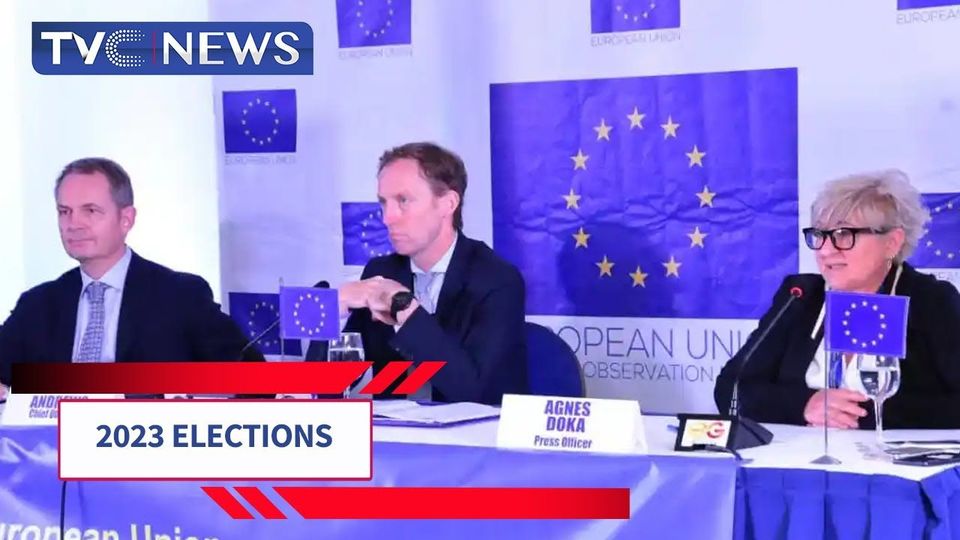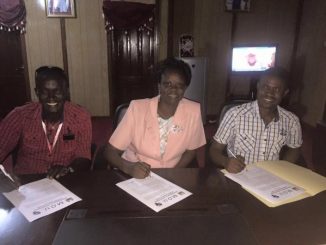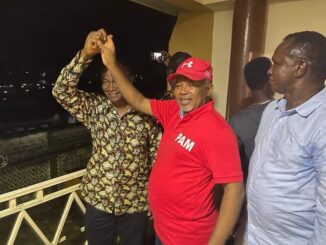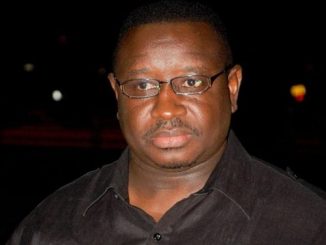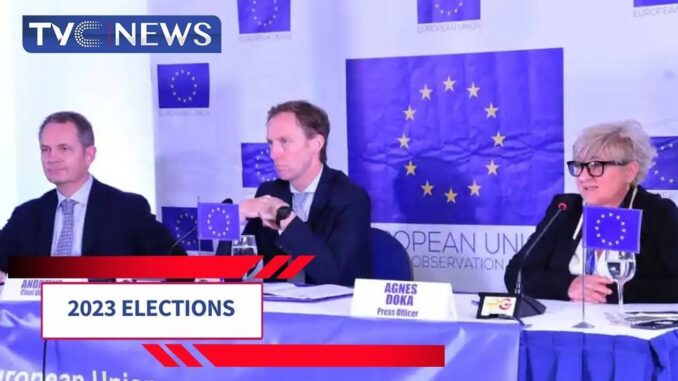
EU FINAL REPORT ON SIERRA LEONE’S 2023 ELECTIONS VERY DAMAGING TO RULING SLPP
YESTERDAY, the European Union Elections Observer Mission released its final report on the Sierra Leone June 24 elections—and nothing could be more damaging to the Maada Bio-led Sierra Leone People’s Party ( SLPP) Government . The report graphically and comprehensively demonstrates how the SLPP rigged the elections with impunity. The findings of the EU are so damning that they have given the opposition All People’s Congress ( APC) added ammunition and impetus to demand a rerun of the elections during the forthcoming mediated interparty dialogue to break the political impasse in Sierra Leone .
WE BRING YOU BELOW EXCEPTS OF THE REPORT WITH APPROPRIATE HEADINGS TO HELP YOU DIGEST THE FINDINGS. This is what the report says (Excepts )
“The ECSL’s lack of transparency affected confidence in the integrity of the elections and
hindered the right of access to information and institutional accountability”.
“The political environment initially allowed for competitive campaigning throughout the country,
in a generally peaceful atmosphere, with a focus on personalities and ethno-regional alliance
building rather than issues. However, in a highly polarised political scenario, with the tensions
raising in the weeks ahead of the polls, the campaigning space became increasingly restrictive
for the APC in several southern and eastern districts. This followed initially localised politically
motivated violence that eventually affected the districts of Kailahun, Pujehun, Kenema, and Bo
in the south and east, as well Kambia in the north-west, all of them except for Kambia strongholds
of the SLPP.”
TABULATION AND ANNOUNCEMENT OF THE RESULTS HELPED DESTROY THE CREDIBILITY OF THE ELECTIONS
Tabulation and announcement of results proved to be the tipping point for the credibility of the elections. The entire process was opaque, meaningful observation was impeded and the declaration of winners was not followed by publication of disaggregated results per polling station. On 27 June, the ECSL declared Julius Mada Bio of the Sierra Leone Peoples’ Party
(SLPP) elected for a second term, passing the constitutional threshold of 55 per cent in the first round by 1.17 percentage points.
STATISTICAL INCONSISTENCIES AND MATHEMATICAL IMPROBABILITIES
Following the declaration of the results of the parliamentary elections a few days later, it was clear that result totals published by the ECSL showed several statistical inconsistencies and mathematical improbabilities. These included notable discrepancies in the number of average valid votes per polling station between the first and second batch of presidential results, varying
from a decrease of 75 per cent to an increase of 31 per cent per district; a difference of up to 23 percentage points per district between the turnout for the presidential and parliamentary elections, with some districts registering substantially lower parliamentary turnouts and others showing significantly lower presidential turnouts; turnout above 90 per cent in five districts; and only 0.4 per cent of invalid votes nation-wide. These inconsistencies, combined with the ECSL’s decision not to publish disaggregated results, undermined the credibility of the tabulation process and voters’ confidence in the outcome of the polls.
APPOINTMENTS OF ELECTIONS COMMISSIONERS ADDED TO PERCEPTION OF POLITICAL BIAS
Early in the process, the ECSL appeared operationally prepared, yet a lack of transparency raised concerns. Against the backdrop of prevailing distrust in state institutions, the presidential appointment of ECSL commissioners added to the perception of political bias. Furthermore, the ECSL itself missed many opportunities to build stakeholders’ trust, as most decisions and procedures were neither published, nor comprehensively explained to the citizens.
VOTERS RIGHTS TO KNOW CANDIDATES WERE DISREGARDED
The candidate registration process was inclusive, yet voters’ right to know whom they would be electing was disregarded. The final candidates’ lists for parliamentary elections were published in the Gazette only four days before the polls; local council lists were made public after the elections. Parties also did not disclose their lists of candidates, adding to uncertainties for voters
and candidates alike.
VIOLENT ATTACKS SHRANK SPACE OF POLITICAL PARTICIPATION IN THE SOUTHEAST
Political violence in weeks before the polls disrupted the playing field in at least six districts. The EU EOM crosschecked and confirmed reports on at least 17 violent attacks, which negatively affected the campaign environment nation-wide. Most assaults of party supporters and attacks on party offices or private properties of politicians went unpunished. It shrank the
space for political participation in the south and south-east.
POLITICAL ACTIVISM WAS DISCOURAGED THROUGH DISPROPORTIONATE USE OF FORCE
Political activism was also discouraged through a demonstrative and disproportionate use of force by security agencies prior to, during and after election day. Live ammunition and tear gas was fired outside the main opposition party’s headquarters in Freetown twice (three days prior to and then one day after the elections). In each case one person was killed. Most stakeholders had low trust in law enforcement bodies due to alleged biased behaviour.
ABUSE OF INCUMBENCY DISTORTED THE PLAYING FIELD
Abuse of incumbency was another factor that distorted the playing field. Active participation of government ministers in rallies, alongside extensive campaign messaging on official government websites and social media accounts, effectively blurred the line between governing and campaigning. The public TV’s favourable coverage of the SLPP was another example of incumbency advantage.
PUBLIC INTIMIDATION OF THE NATIONAL ELECTIONS WATCH (NEW ) AND CLAMP DOWN ON VOICES OF DISSENT
The following public intimidation of NEW by state and non-state actors, punctuated by a disinformation campaign, aimed to clamp down on voices of dissent and clouded future perspectives for genuine, non-partisan civic activism……Overall, the 2023 general elections underscored a clear commitment among Sierra Leoneans to the democratic processes, while also proving an urgent need for further reforms focusing on transparency, trust-building and inclusion.
BOGUS CENSUS REDUCED NUMERICAL POPULATION OF THE APC , WHILE INCREASING SLPP’s
The pre-campaign environment was characterised by strong political tensions between the main political camps and by high ethno-regional polarisation, primarily between the Temne in the north, mainly supporting the APC, and the Mende in the south and east, primarily backing the SLPP. Several issues contributed to this strife. The 2021 mid-term census was disputed by the APC, parts of civil society and data experts. The key controversy concerned a significant numerical population growth in southern and eastern districts, the strongholds of the SLPP, and a numerical population decline in the APC strongholds in the west, including a decrease in Freetown of some 450,000 persons, as well in north and north-west.1 This census contributed to
additional five parliamentary seats in the Southern and Eastern Regions and a reduction of parliamentary representation by two seats in the Western Area.
DELAYS IN PUBLISHING VOTER REGISTER AND LACK OF MEANINGFUL DIALOGUE
Delays in the publication of the voter register and a lack of meaningful dialogue, cooperation and trust-building between the ECSL and the opposition parties compounded the political environment.
MISSING PICTURES, INCOMPLETE DATA, INADEQUATE SOFTWARE CAPTURE OF FIRST-TIME VOTERS AND OMISSION OF VOTERS CAUSED MISTRUST THROUGHOUT ENTIRE ELECTORAL PROCESS
Issues related to the voter registration were widely debated throughout the electoral period, as political parties, the opposition in particular, and civil society organisations were requesting access to and publication of the disaggregated voter register since December 2022.30 Technical problems and oversights included missing pictures, incomplete data, inadequate software capture
of first-time voters, and omission of voters from the provisional voter lists. Many of these problems stemmed from data losses incurred during data transfers with the NCRA. Although the ECSL developed an application for voters to verify their data, provided certificates to concerned voters, and recaptured some 6,000 pictures during the voter card distribution, the voter register remained a source of mistrust throughout the entire electoral process.
SLPP MADE THE ELECTIONS UNCOMPETITIVE THROUGH COURT CASES AGAINST APC FLAGBEARER AND MAYOR
Signs of shrinking civic and political space became evident in 2022. During protests several APC politicians and CSO activists were arrested. Parallel court cases were opened against key APC leaders, including Samura Kamara and the mayor of Freetown, Yvonne Aki-Sawyer, for alleged misappropriation of public funds. Both the arrests and the court cases were seen by several
stakeholders and independent analysts as signs of a more restrictive government course. Threats by the ECSL to withdraw the accreditation of the National Election Watch (NEW) over their findings during the 2022 by-elections added to that perception, as did the controversial confirmation of the ECSL Chair and the Commissioner for the Western Area. The President’s decision to reintroduce the proportional representation (PR) system, despite the Parliament’s refusal to include it in the revised Public Elections Act, also was seen as a move to consolidate political power instead of encouraging a broader national consensus….
There were also uncertainties about the competitiveness of the elections.
A LATE DECISION TO USE THE PR SYSTEM WITHOUT STAKEHOLDER CONSULTATION AFFECTED POLITICAL PLURALISM
The decision to conduct elections under the PR system was taken in late 2022 without broad stakeholder consultation and founded on a constitutional provision,11 challenged in the Supreme Court by the opposition and justified by the court on the absence of valid constituencies. Low level of public awareness of the revived PR system was a common concern throughout the
campaign. Many voters were not aware of how their votes would translate into parliamentary or local council seats, while most EU EOM interlocutors viewed the PR system as largely centralised and depersonalised, lowering deputies’ accountability towards voters. Other aspects of the PR system, such as the filling of potential vacancies, were not discussed.15 EU EOM
interlocutors claimed that the high threshold to enter parliament was challenging to reach for smaller parties and independent candidates, negatively affecting political pluralism.
_______________________________________
READ THE FULL REPORT BELOW
EU Election Observation Mission Final Report
General Elections, 24 June 2023 Pa

